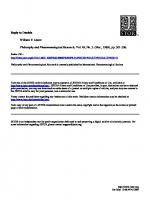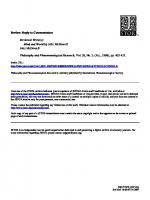
- Author / Uploaded
- Alston William
Reply to Daniels
William P. Alston Philosophy and Phenomenological Research, Vol. 49, No. 3. (Mar., 1989), pp. 501-506. Stable URL: http
1,159 21 106KB
Pages 7 Page size 595 x 792 pts Year 2007
Recommend Papers
File loading please wait...
Citation preview
Reply to Daniels William P. Alston Philosophy and Phenomenological Research, Vol. 49, No. 3. (Mar., 1989), pp. 501-506. Stable URL: http://links.jstor.org/sici?sici=0031-8205%28198903%2949%3A3%3C501%3ARTD%3E2.0.CO%3B2-R Philosophy and Phenomenological Research is currently published by International Phenomenological Society.
Your use of the JSTOR archive indicates your acceptance of JSTOR's Terms and Conditions of Use, available at http://www.jstor.org/about/terms.html. JSTOR's Terms and Conditions of Use provides, in part, that unless you have obtained prior permission, you may not download an entire issue of a journal or multiple copies of articles, and you may use content in the JSTOR archive only for your personal, non-commercial use. Please contact the publisher regarding any further use of this work. Publisher contact information may be obtained at http://www.jstor.org/journals/ips.html. Each copy of any part of a JSTOR transmission must contain the same copyright notice that appears on the screen or printed page of such transmission.
JSTOR is an independent not-for-profit organization dedicated to and preserving a digital archive of scholarly journals. For more information regarding JSTOR, please contact [email protected].
http://www.jstor.org Sat May 12 00:44:45 2007
Vol.
XLIX,
NO. 3, March 1989
Reply to Daniels WILLIAM P. ALSTON
Syracuse University
Before responding to the challenging points raised by Professor Daniels' paper, let me correct a couple of misinterpretations. Daniels argues that whether a practice is J,, "is of very little interest." In support of this judgment he claims that "all sorts of practices we deem superstitious are free of ineradicable inconsistencies and so qualify as J,," (p. 488). However his example of such a superstitious practice is putting "my right shoe on first odd days and my left on first even days in the belief that by doing so I'm liable to make less mistakes in my day-to-day life" (p. 488). But my discussion was confined to doxastic practices (belief-formingpractices), and this practice is not one of those. More importantly, the discussion shows that Daniels is thinking of internal inconsistencies, inconsistences in the output of the practice; and in "Religious Experience and Religious Belief" (hereinafter RERB) my list of reasons for taking a practice to be unreliable, which in any event did not purport to be complete, also included yielding "results that come into ineradicable conflict with the results of other pratices to which we are more firmly committed" (p. 8). We deem certain doxastic practices, like those based on the reading of tea leaves, superstitious because we take their outputs to frequently contradict what is established by ordinary empirical procedures. Second, Daniels' statement that "for Alston, it's practices that are justified" (p. 487) is misleading. In RERB I did say that "practices . . . of belief formation are the primary subject of justification" (something I have thought better of since), but I went on immediately to say "particular beliefs are justified only by issuing from a practice . . . that is justified" (p. 4). Hence it is misleading to suggest that, on my view, it is only practices that are justified. Turning to Daniel's "direct" criticisms, I am puzzled by the way he takes himself to know that PP is J,,. "I can know that PP is J,, even though whether it is isn't verifiable . . . What makes me know? How else am I to put it? - the facts of the matter do" (p. 489). But how do "the facts of the matter" enable me to know that they obtain. (Of course when I
REPLY T O D A N I E L S S O 1
'
know it is always "facts" that bring that about -what else? -but I take it that Daniels is making the more interesting claim that in this case it is the fact known that makes me know it.) Those who hold, from Locke to Prichard, that knowledge consists in the immediate presentation of a fact to one's awareness have an idea of how this can be, but I doubt that Daniels thinks that the fact that PP is J,, is directly presented to his awareness. (If so I would like to have the recipe.) Unfortunately, our human condition is such, at least with respect to most of the matters we would like to know about, that we have to be more roundabout in our cognitive approach, and come to know that p, if at all, on the basis of something else, some experience(s) or some other things we know. And it seems clear that the matter at hand falls under that rubric. Daniels (p. 490) takes exception to my claim that according to Christianity God is too "wholly other" for us to be able to grasp regularities in His behavior, and that "we can only attain the faintest, sketchiest, and most insecure grasp of what God is like." (RERB, p. 10) Here I must plead guilty to overstating the case. It is traditional Christian doctrine that we do have some grasp of the nature of God, e.g., His power and His moral character, that is more than faint or insecure, and that we do have some purchase on regularities in His behavior, e.g., that He will forgive sins under certain conditions. However, it is also sound Christian doctrine that our cognitions of God, in this life, are radically defective, by comparison with our cognitive grasp of created things. As for regularities in behavior, what I was specifically concerned with were regularities in God's appearances to our experience; and here, although we have some notion as to what is conducive to an awareness of God, we are immeasurably worse off than we are when it comes to the conditions under which we can veridically perceive physical objects. And even with respect to, e.g. the forgiveness of sins, no reflective Christian would venture predictions with the same confidence with which we predict the movements of bodies. In short, I overstated differences of degree; but the degree is such as to be sufficient for the point in question. Let me now turn to the main thrust of Daniels' paper: the reasons that the undiscerning, in secular matters, have for supposing that others can discern what they cannot, and the absence of such reasons in the religious analogue. First, I must distinguish between two theses that might be based on this contrast. Daniels' official position is that "none of these reasons gives the non-religious grounds to think a religious side of reality is there to be experienced and the religious at times experience it" (p. 487). But the course of his discussion gives the impression that he thinks that the
absence of such reasons is itself a reason for the negative judgment that no such "religious reality" is being experienced, even though he never explicitly makes this latter claim. (See the final paragraph, in which he speaks of having furnished "justification for scepticism concerning religious experience.") In any event, I wish to consider both theses. I won't really contest the official claim. As will appear in due course, I find some of his contrasts overstated and some irrelevant to the issue in either the religious or the non-religious case; but I do not wish to argue that the non-religious have, in these kinds of considerations, a sufficient reason for supposing that some people genuinely perceive God. Insofar as sufficient reasons for this judgment are available from outside that doxastic practice, they would have to involve the more general epistemological considerations I advance in RERB and other essays. Hence I will turn to an examination of the particular contrasts Daniels adduces and consider how damaging they are to my central thesis. First, a contrast that seems to me trivial: "persistence of belief in the sense or discernment among the educated as more comes to be known about how things actually work in the universe." This is said to hold for various secular special powers of discernment, but not for the religious case, But this contrast is, at best, a frail reed. Fads and fashions are at least as influential among the educated as among the vulgar. If it is true that fewer of the educated believe that there is genuine perception of God than in, say, the fourteenth century, it is, I suspect, less because more is known about "how things actually work" than it is because of the general decay of religious faith in Western society and the spurious plausibility lent to naturalistic metaphysics by the development of science. It certainly isn't due to more being known about how things actually are with God. The supposition that knowing more ab6ut the way things work in the physical universe puts one in a better position to determine whether there is veridical perception of God is the most blatant kind of question begging. I've started with Daniel's last "reason" and will continue in a backwards direction. The third is: "trivial yet complex webs of beliefs due to the sense or heightened discernment." He points out, correctly, that even unusual sensory powers yield a mass of uninteresting as well as interesting results; whereas people who perceive God are generally aware of only what it is of special interest to them. I have myself pointed to this contrast in "Perceiving God" (hereinafter PG), calling attention to the fact that whereas sense experience is "richly detailed," the deliverances of religious experience are meager (p. 659). But what is to be gathered from that? Daniels suggests that to the extent that only what is important to the person gets presented, we have more reason to explain the experience in
REPLY T O D A N I E L S 503
terms of the personal needs and emotions of the person rather than in terms of the impact of the reality putatively perceived. But that presupposes that any mode of objective perception will most likely be like sense perception in this regard. What basis is there for this assumption? Why should we suppose that a source that yields less detailed beliefs is more suspect than a richer source? A priori it would seem just as likely that some aspects of reality are humanly graspable only in a fragmentary manner as that some are graspable in a more nearly complete fashion. And as for the point that alleged peceivers of God, but not of nature, perceive only what is specially interesting to them, perhaps that is because everything about God is of enormous interest and importance to us, whereas many of the details of the physical and social environment are boring. Daniels' second reason is: "success in actions which the sense or refinement of discriminatory power explains." Here I simply do not agree that the two spheres are sharply contrasted in this respect. In both cases, I would suggest, those who master the perceptual skills are thereby in a superior position to carry out certain tasks. The difference in the two cases, the one that leads Daniels to argue as he does, is that it is much easier to see this in the secular than in the religious cases. This is due, I believe, to two factors. First, the motivational factor looms much larger in the religious case. If one exercises visual powers, one needs no special, difficult, or unusual motivation to put to use the information thus gained. Everyone is concerned to get around in the environment effectively, and so the additional information available to the sighted will inevitably be put to work, with results apparent to everyone. But one who is aware of God, even one who is aware of God frequently, may or may not be strongly enough motivated to change her life in accordance with what she percounsellor knows all too ceives God's will for her to be, as anyspiritual . well. Hence the overt fruits of the perceptual skill may not be forthcoming. To be sure, according to Christianity, there is special help from God (grace) that enables many persons to develop spiritually in ways they would not otherwise be able to. But this is not a direct outcome of the perceptual discriminations and so does not fall under this rubric. Second, and more important, it is not easy to appreciate from outside the practice what the appropriate behavioral fruits of the discernment of God would be, a fact unwittingly illustrated by Daniels in his assimilation of Ralph Nader to Mother Theresa. First, what is it that the practicioner of CP learns thereby that is most relevant to her overt behavior? God's will for her. So the appropriate overt manifestation would be to carry this out in her life. But this may not be primarily a matter of good works, as these are construed by the secular culture, and so the fact that the practice leads to
greater "success in actions" may not be widely appreciated. But, you will say, can't we ask the individual what she takes herself to have discerned God's will for her to be? That will then put us in a position to gauge her success in carrying this out. Fair enough. But what if she tells you that an essential part of God's will for her is that she becomes more responsive to the Spirit as it guides her moment by moment? Or what if she tells you that she has been called by God to a contemplative vacation? Will you take yourself to be in a position to gauge a success'^ in the appropriate actions? I do not want to suggest that outsiders are in no position to discern spiritual fruits. Some of the most conspicuous cases of sainthood are widely recognized. Nevertheless, the application of this criterion to the religious case is not so straightforward as Daniels seems to suppose. This brings me to Daniels' first and most substantial reason, which is really twofold: ( I ) agreement independent of authority (in what is perceived and what it is perceived to be), and ( 2 ) the possibility of alternative explanation of the above mentioned agreement and of the experiences themselves. As for ( I ) Daniels contends that, unlike the case of special sensory powers, "when there is agreement in religious experience, the agreement seems traceable to authority, and authority again mediates when there turns out to be uncertainty or disagreement" (p. 496). I agree that authority bulks larger in religious than in secular belief. (Though this is only a matter of degree; the authority of science or of common experience or just of the accepted picture of the world, is often invoked to discredit of flying saucers, of levitation, etc.) But my sense perceptual reports account of this difference of degree is quite different from Daniels'. The individual experiencer is granted less autonomy than sense perceivers in religious communities just because (a) we have a less detailed and secure cognitive grasp of God with the result, among others, that reports diverge more often and more sharply (another difference of degree), and (b)there is a greater difference among participants as to degree of mastery of the perceptual skills. (Virtually all normal adults are equally masters of sense perception, except for certain special skills like wine tasting.) As a result the pooled experience of the community, which draws heavily on the most spiritually (and perceptually) advanced members, plays a larger role in supplementing and correcting the experience of individual members, though, as indicated above, this phenomenon is by no means absent in the sense perceptual sphere. These considerations enable us to understand the role of authority in religious perception without taking it to discredit claims to the objective validity of such perception. As for ( 2 ) , Daniels says that "It is not at all difficult, however, to construct a plausible explanation not consisting of mere possibilities like the
-
REPLY T O D A N I E L S
50s
machinations of demons, why people should come very strongly to believe there to be a divinely populated religious reality which is perceived in religious experiences even when there is none" (p. 497). He proceeds to sketch such an explanation, not, perhaps, one of the more plausible of its breed. However, so far as I can see, such imaginative exercises prove nothing. Whatever the interplay of natural causes in the generation of religious experience, we are still left with the question of whether God is perceived therein. But, you say, if such experience can be adequately explained in terms of natural factors, that would show that God is in no way responsible for the experience and that in turn would show that God isn't really being perceived in the experience. Not so. After all, it is very plausible to suppose that all experience, including sense experience, is proximately caused only by goings on in the brain; but that is not taken to show that the supposed perceived external objects exercise no causal influence on the experience and thereby cannot be perceived therein. The point is, of course, that they can play a causal role further back along the causal chain leading to the experience. Likewise, even if religious experience is proximately causally explainable solely in terms of natural factors, that is quite compatible with God's figuring further back in the causal chain leading to the experience and so being a live candidate for what is perceived therein.









